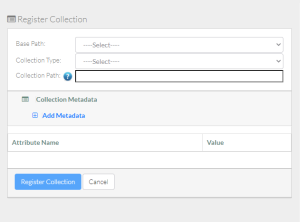This page describes how to create an empty collection from the Browse page or the Register menu. The following conditions must be true for the existing collection in which you intend to create the empty collection:
- Your user account has the Write or Own permission level on the existing collection.
- That existing collection has been configured to contain another collection.
To create a collection:
- Log in as described in Logging In via the GUI. The Dashboard appears.
- Browse for the data destination, as described in Browsing for Data via the GUI. Navigate to and right-click the existing collection in which you want to create your new collection. Click Add Collection. (Another option is as follows: Click Register > Collection.) The Register Collection page appears.
If you browsed to the data destination, that portion of the page has only the Collection Type and Collection Path fields, with a system-generated collection path already specified. If the Base Path field is available, select the base path specified by your group administrator. An information icon () appears next to the Base Path field and the system begins to populate values in the Collection Type field.
Consider examining the valid hierarchy for the selected base path. To do so, click the information icon next to the Base Path field. A Valid Hierarchy and Mandatory Metadata chart appears. For details, refer to Viewing the Valid Hierarchy and Metadata Information for an Archive.
- Specify the rest of the data destination:
If there is more than one collection type, select one for the new collection. For guidance on selecting a collection type, refer to your group administrator. For some collection types, the system displays a list of required and/or optional metadata attributes.
In the Collection Path field, specify the full path, including the base path and the name of the collection you intend to create. Avoid using invalid characters such as the space character, question mark (?), semicolon (;), backslash (\), or double quote ("). Consider the following example:
Path Example Base path /SAMPLE_Archive Collection path /SAMPLE_Archive/Sample_Collection_Name
- Consider hovering over the information icon () for each required attribute. A tooltip appears with information about that attribute.
- Specify the collection metadata:
- To add a metadata attribute:
- Click Add Metadata, visible on the right or left side of the page. A blank attribute row appears.
- Specify a unique attribute name.
If you change your mind about adding an attribute, click the trash can icon next to that attribute. If you proceed to update the collection with a new attribute, the attribute name is permanent.
- Click Add Metadata, visible on the right or left side of the page. A blank attribute row appears.
- In each attribute row, specify a unique value that describes the content you are registering. The character limit for each metadata value is 2700.
Example Attribute Example Value data_owner Jane Doe project_id 1234567890 sample_name L1 project_start_date 2020-12-31 For some date attributes, such as project_start_date, the system expects the "yyyy-MM-dd" format, as in the above example.
Click Register Collection. The system checks whether the data you have entered is valid for the selected base path and collection type:
- If the data you have entered is not valid, the system displays an error message.
- If the data you have entered is valid, the system saves the new collection. The Collection page appears, displaying details about the new collection. For information, refer to Viewing Metadata via the GUI.


